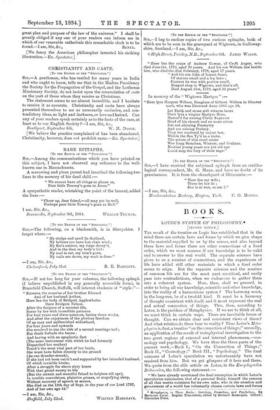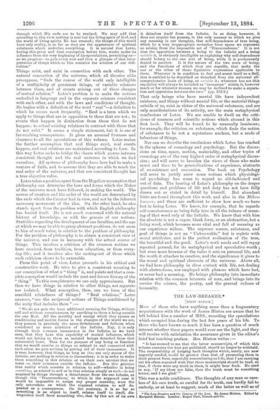BOOKS.
THE result of the treatise on Logic has established that in the mind there are certain laws and forms by which we give shape to the material supplied to us by the Senses, and also beyond these laws and forms there are other connections of a fixed order, which we must assume if our knowledge is to be valid and to answer to the real world. The separate sciences have given to us a number of connections, and the experiences of life have added still other materials in which a fixed order seems to reign. But the separate sciences and the maxims of common life are for the most part uncritical, and easily pass into contradictions, when we endeavour to gather them into a coherent system. How, then, shall we proceed, in order to bring all our knowledge, scientific and other knowledge, into the reality of a harmonious system ? The harmony must, in the long-run, be of a twofold kind. It must be a harmony of thought consistent with itself, and it must represent the real and actual connection of things. This, then, according to Lotze, is the problem of Metaphysics. If we are to think at all, we must think in certain ways. There are inevitable forms of thought. Can we obtain clear and consistent views of these ?
And what relation do these bear to reality ? Thus Lotze's Meta- physics is, first, a treatise "on the connection of things ;" secondly,
an application of the result of metaphysical investigation to the two great regions of external and internal phenomena,—cos- mology and psychology. We have thus the three parts of the
present work,—Book I., "On the 'Connection of Things ;" Book II., " Cosmology ;" Book III., "Psychology." The final outcome of Lotze's speculation we unfortunately have not received from him. But we get glimpses of it here and there. We quote from the able article on Lotze, in the Encyclopedia Britannica, the following statement :— "We have already mentioned the final conception in which Lotze's speculation culminates, that of a personal Deity, himself the essence of all that merits existence for its own sake, who in the creation and government of a world has voluntarily chosen certain laws and forms • Metaphinia, in Throe Book. : Ontology, Counology, and Psychology. By Hermann Lotze. English Translation, edited by Bernard Bosanquet. Oxford : Clarendon Preys.
through which His ends are to be realised. We may add that according to this view nothing is real but the living spirit of God, and the world of living spirits He has created ; the things of this world have only reality, in so far as they are the appearance of spiritual substance which underlies everything. It is natural that Lotze, having this great and final conception before him, works under its influence from the very beginning of his speculations, permitting us— as we progress—to gain every now and then a glimpse of that inter- pretation of things which to him contains the solution of our diffi- culties."
Things exist, and exist in connection with each other. The natural conception of the universe, which all theories alike presuppose, "finds the course of the world only intelligible of a multiplicity of persistent things, of variable relations between them, and of events arising out of these changes of mutual relation." Lotze's problem is to make the notions embodied in language and in the separate sciences consistent with each other, and with the laws and conditions of thought. He begins with a definition of the word "real "—a definition to which he recurs most frequently. "Real is a term which we apply to things that are in opposition to those that are not ; to events that happen in distinction from those that do not happen ; to actual existing relations in contrast with those that do not exist." It seems a simple statement, but it is one of far-reaching consequences. It gives an unusual firmness and clearness to all the speculations of this volume. Lotze makes the further assumption that real things exist, real events happen, and real relations are maintained according to Law. In this way Lotze seeks to bridge the chasm which yawns between consistent thought and the real universe in which we find ourselves. All systems of philosophy have here had to make a venture of faith, and to assume that they are able to reach the real order of the universe, and that our consistent thought has a true objective value.
Lotze takes a position apart from the Hegelian assumption that philosophy can determine the laws and forms which the Maker of the universe must have followed, in making the world. The course of creation and the order of the world are determined by the ends which the Creator had in view, and not by the inherent necessary movement of the idea. On the other hand, he also stands apart from the problem with which English philosophy has busied itself. He is not much concerned with the natural history of knowledge, or with the genesis of our notions. Statistics regarding the development of our faculties, and the age at which we may be able to grasp abstract positions, do not seem
to him of much value, in relation to the problem of philosophy. For the problem of philosophy is to obtain a consistent view of
the universe, and one in harmony with the actual course of things. This involves a criticism of the common notions we have received, from tradition, from education, or from every- day life ; and it involves also the casting-out of those which such criticism shows to be untenable.
From this point of view, Lotze proceeds in his critical and constructive work. He tries to give a consistent meaning to our conception of what a " thing " is, and points out that a com- plete conception would include the past and future history of the "thing." To this completeness we can only approximate. But then we have things in relation to other things, not separate nor isolated. What conception, then, can we form of this manifold relatedness of things ? "Real relations," Lotze answers, "are the reciprocal actions of Things conditioned by the unity that includes them" :—
"We do not gain the least additional meaning for Things, without self and withont consciousness, by ascribing to them a being outside the one Real. All the stability and energy which they ensure as conditioning and motive forces in the changes of the world we see, they possess in precisely the same definiteness and fullness when considered as mere activities of the Infinite. Nay, it is only through their common immanence in the Infinite, as we have eeen, that they have this capability of mutual influence, which would not belong to them as isolated beings detached from that substantial basis. Thus for the purpose of any being or function that we would ascribe to things as related to and connected with each other, we gain nothing by getting rid of their immanence. It is true, however, that things, so long as they are only states of the Infinite, are nothing in relation to themselves; it is in order to make them something in this relation or on their own account that we
insist on their existence outside the Infinite. But this genuine true reality which consists in relation to self—whether in being something as related to self or in that relation simply as such—is not acquired by things through a detachment from the one Infinite, as though this 'Transcendence,' to which in the supposed case it would be impossible to assign any proper meaning, were the only antecedent on which the required relation to self de- pended as a consequence. On the contrary, it is so far as something is an object to itself, relates itself to itself, dis- tinguishes itself from something else, that by this act of its own
it detaches itself from the Infinite. In so doing, however, it does not acquire but possess, in the only manner to which we give any meaning in oar thoughts, that self-dependence of true being, which by a very inappropriate metaphor from space we represent as arising from the impossible act of Transcendence.' It is not that the opposition between a being in the Infinite and a being outside it, is obviously intelligible as explaining why self-dependence should belong to the one sort of being, while it is permanently denied to another. It is the nature of the two sorts of being, and the functions of which they are capable, that make the one or the other of these figurative expressions applicable to them. Whatever is in condition to feel and assert itself as a Self, that is entitled to be described as detached from the universal all- comprehensive basis of being, as outside it; whatever has not this capability will always be included as 'immanent' within it, however much or for whatever reasons we may be inclined to make a separa- tion and opposition between the two." (pp. 172-3.)
That only beings who have mental life have independent existence, and things without mental life, or the material things outside of us, exist in virtue of the universal substance, and are only manifestations of its activity, are the main metaphysical conclusions of Lotze. We are unable to dwell on the criti- cisms of common and scientific notions which abound in this first book. They will be found to be unusually luminous ; for example, the criticism on substance, which finds the notion of substance to be not a mysterious nucleus, but a mode of behaviour of things.
Nor can we describe the conclusions which Lotze has reached in the spheres of cosmology and psychology. But the discus- sions on time, space, motion, materiality, and other topics of
cosmology are of the very highest order of metaphysical discus- sion; and will serve to broaden the views of those who make space and time to be generalisations of experience, abstracts of co-existence and succession. The book on Psychology will serve to justify anew some notions which physiologi- cal pyschology has come to regard as old-fashioned and out of date. The bearing of Lotze's philosophy on the deeper questions and problems of life and duty has not been fully drawn out or stated in detail by himself. But abundant
hints are found throughout this work, and also in the Mikro- kosmus ; and these are sufficient to show how much we have lost in losing Lotze. We know, for example, that he regards self-consciousness as being fully true in all the fulness of mean- ing of that word only of the Infinite. We know that with him the absolute is not a vague, blank form, or an abstraction, but a living word, which becomes more vital and full of meaning as our experience widens. The supreme source, substance, and
goal of things is not an Unknowable," but is replete with moral attributes, and is the perfect realisation of the true, the beautiful and the good. Lotze's work needs and will repay repeated perusal, for its metaphysical and speculative worth ; but even more because of the value it sets on personal life, and the worth it attaches to creation, and the significance it gives to the moral and spiritual elements of the universe. Above all,
we find here philosophy in close contact with life, not dealing with abstractions, nor employed with phrases which have lost, or never had a meaning. He brings philosophy into immediate relation with the common interests of man, and brings into its
service the science, the poetry, and the general culture of humanity.



































 Previous page
Previous page